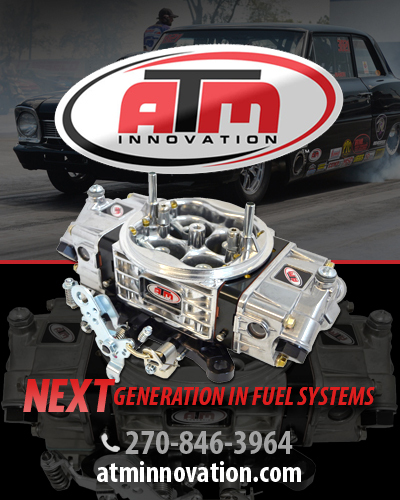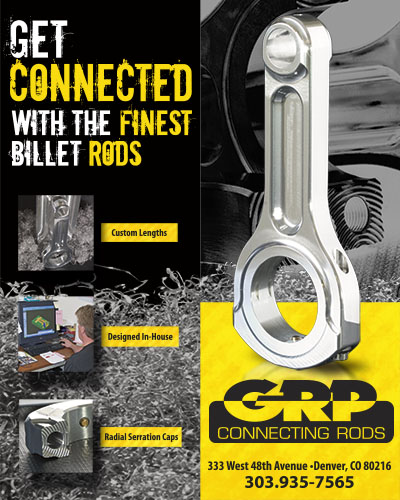THE PRESIDENT SPEAKS: A CASUAL CONVERSATION WITH NHRA'S GLEN CROMWELL
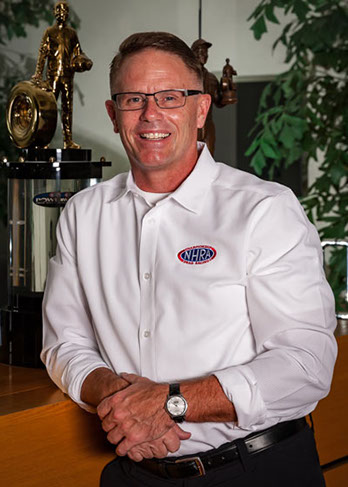 Today marks 38 days since NHRA officials made the announcement major-league drag racing was suspended. From this point, uncertainty has flooded the community as has revised schedules.
Today marks 38 days since NHRA officials made the announcement major-league drag racing was suspended. From this point, uncertainty has flooded the community as has revised schedules.
There are now 46 days before NHRA plans to resume an ambitious schedule which includes 17 events, starting with Gainesville, Fla., June 5-7, 2020. Next month the series is planning to resume its Lucas Oil Divisional Series.
Many families and businesses have been crippled by the worldwide pandemic, and the NHRA is no different. The race series furloughed a number of its team members.
The situation with the NHRA apparently is a fluid one with decisions dependent on member track's state regulations in place, and a whole lot more questions than answers available.
CompetitionPlus.com's Bobby Bennett recently spoke with NHRA President Glen Cromwell and asked him questions pertinent of today's NHRA, and some about the future.
BOBBY BENNETT - Let's go back in time to the point when you're flying to Gainesville for the Gator Nationals, we knew this pandemic starting to rear its ugly head out here in the world. What was your first reaction when the authorities said that they were shutting down Gainesville?
GLEN CROMWELL - Well, obviously heartbreaking. You know, it was something that, the NHRA and the local authorities, state and official. Casey Kohler, who's our general manager at Gainesville Raceway, we're in discussions, and it was a tough decision. It was heartbreaking for our fans.
There is a tremendous amount of excitement around the 51st Amalie Motor Oil Gatornationals. I mean, our advanced ticket sales were up, the forecast was spectacular, and it was tough. It was a tough decision that all of us had to make. But I think we did realize the enormous risk that we would be putting people in danger of this pandemic and, ultimately, when you take a step back, it's about safety and it's about safety for our stakeholders, especially our fans. And we knew what was the right decision, but for sure it was, it was heartbreaking.
BB - I was one of those people traveling on my way to Gainesville when the event got cancelled. And little did I know that I was carrying the virus. I would have been working in that situation, and God knows how many people with whom I would have interacted. Do you think that they were more of those kinds of situations out there that we had no clue was out there?
GC - Absolutely. I think that was part of our discussions that we were having on Wednesday and Thursday morning. And putting people in danger is exactly what you're talking about. People that would be inviting fans to come to the Gatornationals and potentially could expose other fans and really have this thing take off. Those are the things that we were thinking about and looking back at it. I'm confident we made the right decision for everybody involved.
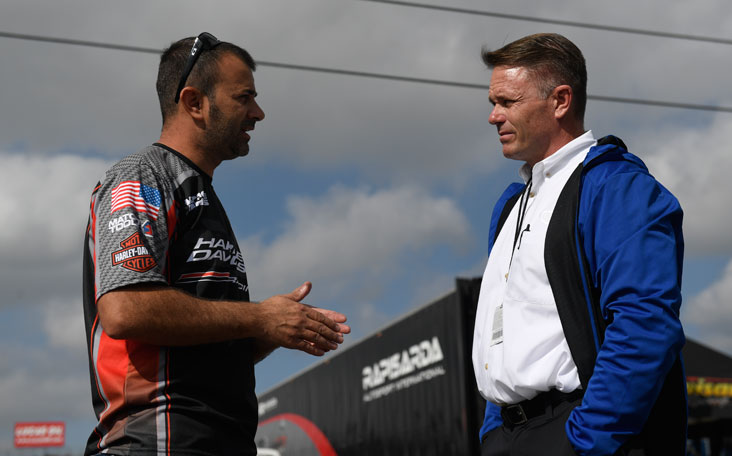 BB - I can tell you when I was driving to Gainesville, and I got the note that the race had been postponed. I said to myself, 'Oh my gosh, are we not kind of overreacting with this?"
BB - I can tell you when I was driving to Gainesville, and I got the note that the race had been postponed. I said to myself, 'Oh my gosh, are we not kind of overreacting with this?"
And then like the next day I got heart-punched with the COVID-19.
On a personal level, was it hard to take this pandemic serious at first? And if you couldn't take it seriously, when did it all hit home for you?
GC - I was like everybody else, we were keeping an eye on it, but I think when it really hit home was probably just before Gainesville. It became pretty evident that we were dealing with a pandemic, and we had to act quickly. So I think it really was just prior to Gainesville and I believe that and this kind of comes back to you.
Your article on Competition Plus, a lot of people read it and that hit home because you were the first person that I knew that had it and explained how serious it was. And I think when you finally have someone that you are close to or you know personally, that's when it hits you. So thank you for writing that article. I think that that hit home for the entire NHRA Drag Racing community.
BB - Got more calls, texts and emails than I had seen in a long time.
GC - It tells you about the community that I talk about. In normal times, we're all trying to make the sport better, and we sometimes have our difference of opinions. But I'd tell you in situations like this, we all come together, which puts a big smile on my face.
BB - I know one thing that didn't put a big smile on your face is when they had to furlough workers for obvious reasons. Wasn't so many years ago that you would have been one of those that face that fate. That had to be one of the darkest days you've faced since being president.
GC - I'd probably say that it's the toughest. It's the hardest thing I've had to do, and I should say we as a company, we made this decision. You work with our employees side-by-side, shoulder by shoulder, and we do it together. We're a great team. To make that decision is extremely heartbreaking.
Our employees, they truly are the engine of what we do, and they have the most passion, most dedication, and they truly just love the sport. And to do something like that is extremely hard. But you also have to balance the ability to preserve the sport, and you got to look forward, and sometimes we have to make difficult decisions. I think at the end of it we're going to do everything we can to get them back. They know that we're working extremely hard and we want to get them back as soon as we can.
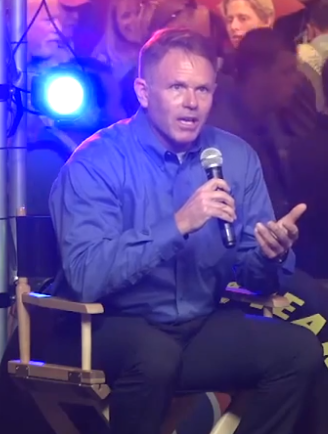 BB - As long as I've known you, you've been the kind of guy who's always had the hands-on approach, fixed stuff, kind of guy. How hard and challenging is it for you to be the person you've always been when you face an uncertain future when there are little or no answers?
BB - As long as I've known you, you've been the kind of guy who's always had the hands-on approach, fixed stuff, kind of guy. How hard and challenging is it for you to be the person you've always been when you face an uncertain future when there are little or no answers?
GC - Well it's been a very stressful time. I know you would agree with that for everyone. I mean, but however, I would say it's amazing to me how the entire NHRA Drag Racing community has pulled together during this difficult time. We all talk about in NHRA, and we're all a family, and it really rises to the top. When you have a situation like this, it becomes very evident how much everybody cares. I will tell you; our track partners have been great. As you know, we had to reschedule our national event, and it took a lot of effort from our truck partners to shift and move things around, and they were extremely flexible and cooperative. It was great. Our sponsors have stood by us, supporting us for the sport.
Our race teams have been incredible. I talked to our race teams every day. They are chomping at the bit to get back onto the track. And you know, and of course our race fans, we say it all the time, we have the greatest fans at the NHRA, and this is even more evident. Our fans are sending emails, texts, and Facebook posts, talking about, 'Can't wait to get back to racing."
When in this difficult time people pulled together, and you see how great the sport is. Has it been tough? Yeah. But when you have a team of people like this, it does make it a lot better.
BB - Outside of driving yourself crazy, wondering when NHRA Drag Racing can get back to normal, what have you done to keep yourself engaged?
GC - I think first and foremost, communication. We've had a tremendous amount of meetings, and we have them every day. But communication is number one. Our leadership team and our division directors, hat's off to them who have been communicating every day to all of our member tracks and all of our sportsman racers. They've done an unbelievable job. Our leadership team has taken on the responsibility to reach out to all of our stakeholders, keeping them up to speed on our thoughts and our plans. We have been busy every single day, and I'm extremely happy about that.
BB - How much do you think this crisis will change the face of the sport when we go back? Do you think we'll ever go back to normal?
GC - Well, no question. There is definitely going to be some strong headwinds for everyone. I'm confident that NHRA Racing community will all pull together; I truly believe better than it's ever been. It goes back to the people in our sport, and this is what we do. Whether you work for NHRA or you're out drag racing team or on our race tracks, we have the best fans. We have the best employees. We will come back, and we're going to, we will build this to be even a better sport than what it was before.
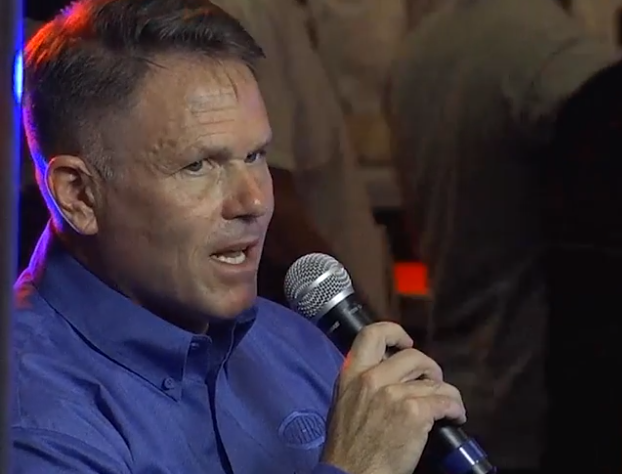 BB - I think an acronym that comes to mind here, WWWD, and what that means is, "What Would Wally [Parks] Do?" Did you ever find yourself thinking about how would Wally Parks have handled this situation?
BB - I think an acronym that comes to mind here, WWWD, and what that means is, "What Would Wally [Parks] Do?" Did you ever find yourself thinking about how would Wally Parks have handled this situation?
GC - I think he would've done a lot of things that we're doing. I think what made Wally so special is that he was a great communicator and really cared about the people, and I would say we care about the people just like he did.
When we look back, in what has happened so far, "what would Wally have done?". I think he would have done exactly what we're doing. I think his passion; his dedication carries on through everybody at our team. And I think the things that I just said about the employees were passed on from Wally to everybody at the NHRA including myself.
BB - The Florida governor, Ron DeSantis, apparently declared that professional wrestling was an essential business. When you look at that, did you get encouraged or angered with NHRA scheduled for an early June return?
GC - I'm encouraged. I think naturally, I am an optimistic person. I'm looking for always the good things in people and decisions, and I think that opens the door. I think drag racing across the country can be considered an essential business. I think it's a crack in the door and I think it's moving in the right direction and I think we're going to get closer to where you will see NHRA Drag Racing as an essential piece of business for our fans and our participants.
BB - This is a hot topic conversation. When you hear a track, an NHRA member track is going to open up regardless of what state restrictions are in place as the president of that sanctioning body. Does that make you cringe or what?
GC - The most important thing that is happening today is we're dealing with a virus, a pandemic and the safety of human beings and we owe it to ourselves as being responsible people to make sure that that is what we look out for.
We all love drag racing, we all love the NHRA. We love every piece of what we do. And I know that people are extremely eager and frustrated to get back. I feel similar feelings, but you have to contain those and prioritize and make sure that first and foremost that we watch out for the health and care for everybody in this world.
BB - What is the NHRA's re-engagement plan or is there one?
GC - There is one. First, we must be allowed to race. That's first and foremost, important plan, which will be decided by the federal state and county. We will have a phased-in approach. We do see smaller events possibly in our member tracks, maybe even at the national event tracks, small national opens. Our division directors are working on some specialty races that could include up to 25, 50 to 100 cars, and we'll work our way up to divisional and regional races.
We really see a very phased-in approach as we get back to racing, and I think that that is a start and we will continue to build on that re-engagement plan as things open up.
BB - If I had the opportunity to bring together every NHRA Drag Racing fan, and you could speak to them right now, what would you say?
GC - Thank you. Thank you for supporting the greatest sport on earth. We are doing everything in our power to get these race cars back on track and give you the best entertainment you can possibly ask for.































